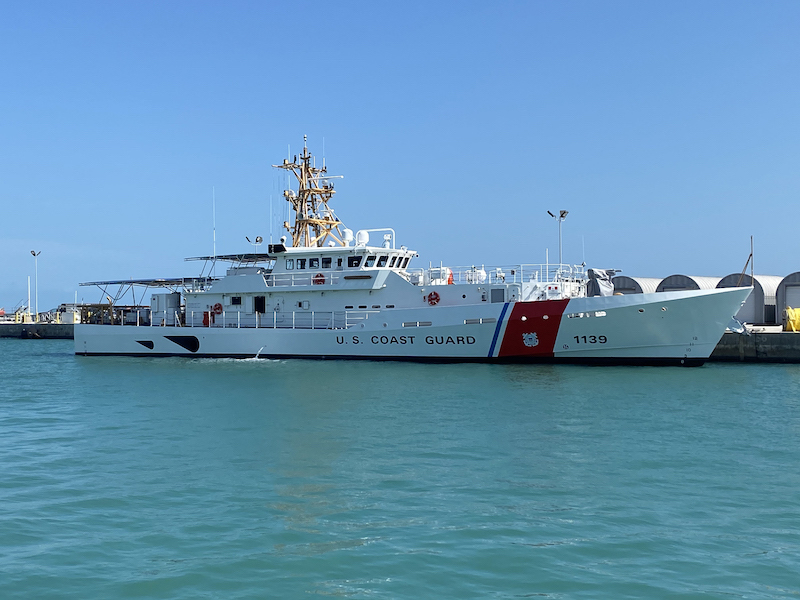Bollinger Shipyards LLC has delivered the 154'x25' USCGC Myrtle Hazard to the U.S. Coast Guard in Key West, Fla. This is the 162nd vessel Bollinger has delivered to the U.S. Coast Guard over a 35-year period and the 39th fast response cutter (“FRC”) delivered under the current program.
For the FRC, which has a draft of 9'6", Bollinger is using a proven, in-service parent craft design based on the Damen Stan Patrol Boat 4708. Main propulsion comes from twin MTU 20V4000 M93L diesel engines, producing 2,900 hp each.
The Myrtle Hazard is the first of three FRCs to be homeported in Apra Harbor, Guam, increasing the presence for the U.S. Coast Guard in the Indo-Pacific Theater. Additionally, later in 2020, Bollinger will be delivering the first of six FRCs that will be homeported in Manama, Bahrain, which will replace the Island Class patrol boats supporting the Patrol Forces Southwest Asia, the U. S. Coast Guard's largest unit outside of the U.S.
The homeporting of three FRCs in Guam is part of the U.S. Coast Guard’s "doubling down on Oceania," allowing more frequent and longer patrols in an area where the U.S. Coast Guard has increased its presence over the past 18 months and is aligned with the priorities set in the 2018 National Defense Strategy on countering strategic competitors such as China and Russia. U.S. Coast Guard Commandant Admiral Karl Schultz stressed the strategic importance of the service’s presence in the region saying, "We're on a trajectory where the geostrategic importance of the Oceania region has not been higher here in decades, and it's a place that the Coast Guard's looking to be part of the whole-of-government solution set."
“Our latest delivery of the USCGC Myrtle Hazard is an important milestone in the FRC Program as it is the first of several vessels that will expand and support the Coast Guard’s operational presence and enhance the U.S.’s mission in the Indo-Pacific region — a focal point emphasized by both President Trump and Admiral Shultz,” Bollinger resident & C.E.O. Ben Bordelon, said in a statement announcing the delivery. “Building ships for the U.S. Coast Guard provides critical assets to bolster our national security interests, both domestic and abroad. We are proud and humbled to be partners in the FRC program.”
While the last 12 weeks of the Myrtle Hazard’s build occurred during the COVID-19 global pandemic, Bollinger undertook precautions to ensure the health and safety of employees and maintain its delivery schedule. In addition to increased and enhanced sanitization practices across the shipyard, Bollinger enacted more liberal leave and remote work policies as well as altered shift schedules to promote social distancing. Bordelon continued, “Delivering vessels on schedule and on budget to the Coast Guard in these unprecedented times given the COVID-19 challenges that we are all facing shows the resiliency and dedication of our incredibly capable workforce. The FRC hot production line continues to produce and provide stability in the industrial base for the U.S. Government and our Bollinger workforce, assuring economic benefit for the Lafourche Parish Louisiana region, our vendor partners in the 40-plus states that support the FRC program, and our country”
Each FRC is named for an enlisted Coast Guard hero who distinguished himself or herself in the line of duty. A young mother in 1918, Myrtle Hazard answered a help wanted ad for a qualified radio operator after graduating from a radio and telegraphy class at the Baltimore YMCA. Extremely skilled in telegraphy and proficient in Morse code, the Coast Guard enlisted Hazard on Jan. 21, 1918, and she became the service’s first female electrician. Hazard worked at U.S. Coast Guard headquarters in Washington, D.C. as an electrician’s mate 3rd class and was later promoted to electrician, 1st class, before being demobilized after the war’s end.





